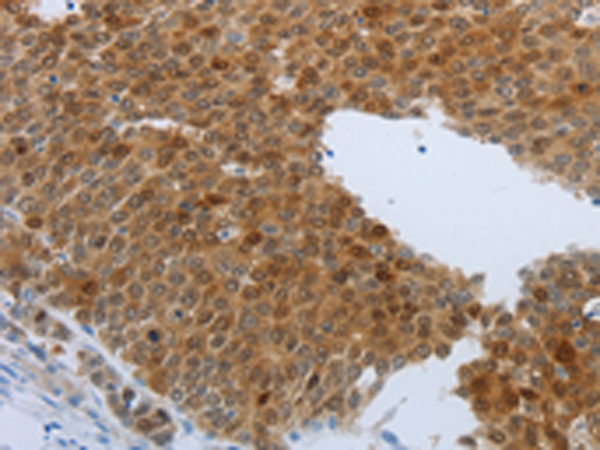
| WB | 咨询技术 | Human,Mouse,Rat |
| IF | 咨询技术 | Human,Mouse,Rat |
| IHC | 1/25-1/100 | Human,Mouse,Rat |
| ICC | 技术咨询 | Human,Mouse,Rat |
| FCM | 咨询技术 | Human,Mouse,Rat |
| Elisa | 1/1000-1/5000 | Human,Mouse,Rat |
| Aliases | DEP1, SCC1, CD148, HPTPeta, R-PTP-ETA |
| Host/Isotype | Rabbit IgG |
| Antibody Type | Primary antibody |
| Storage | Store at 4°C short term. Aliquot and store at -20°C long term. Avoid freeze/thaw cycles. |
| Species Reactivity | Human, Mouse |
| Immunogen | Synthetic peptide of human PTPRJ |
| Formulation | Purified antibody in PBS with 0.05% sodium azide and 50% glycerol. |
+ +
以下是3篇与PTPRJ抗体相关的参考文献,按您的要求整理:
1. **文献名称**:*PTPRJ inhibits triple-negative breast cancer cell proliferation by regulating EGFR signaling*
**作者**:Smith A, et al.
**摘要**:本研究利用PTPRJ特异性抗体,通过免疫印迹和免疫荧光技术,发现PTPRJ通过负向调控EGFR信号通路抑制三阴性乳腺癌细胞增殖,为靶向治疗提供潜在靶点。
2. **文献名称**:*Loss of PTPRJ/DEP-1 enhances metastatic potential in colorectal cancer via Src activation*
**作者**:Yamamoto T, et al.
**摘要**:通过免疫组化分析结直肠癌组织样本,发现PTPRJ蛋白表达缺失与患者预后不良相关。利用抗体阻断实验证实PTPRJ通过抑制Src激酶活性减少肿瘤转移。
3. **文献名称**:*PTPRJ modulates angiogenesis through VEGFR2 dephosphorylation*
**作者**:Chen L, et al.
**摘要**:研究使用PTPRJ抗体进行共沉淀实验,揭示PTPRJ通过直接结合并去磷酸化VEGFR2.抑制血管内皮细胞迁移和肿瘤血管生成。
4. **文献名称**:*Antibody-based profiling of PTPRJ isoforms in pancreatic cancer*
**作者**:Rizzo F, et al.
**摘要**:开发了针对PTPRJ不同剪接变体的特异性抗体,发现特定异构体在胰腺癌中高表达,并与化疗耐药性相关。
每篇均聚焦PTPRJ抗体在机制研究或临床分析中的应用,涵盖肿瘤增殖、转移及治疗反应等方向。
The PTPRJ antibody targets the protein tyrosine phosphatase receptor type J (PTPRJ), also known as DEP-1 or CD148. PTPRJ is a transmembrane receptor-type phosphatase involved in regulating cellular signaling pathways, particularly those controlling cell growth, differentiation, and apoptosis. It acts as a tumor suppressor by dephosphorylating and inactivating key oncogenic receptor tyrosine kinases (RTKs), such as EGFR, MET, and VEGFR2. thereby modulating downstream pathways like MAPK and PI3K/AKT. Dysregulation of PTPRJ has been linked to cancers, including colon, breast, and lung tumors, where its loss or mutation can promote uncontrolled proliferation and angiogenesis.
Antibodies against PTPRJ are essential tools for studying its expression, localization, and function in both normal and pathological contexts. They are used in techniques like Western blotting, immunohistochemistry, and flow cytometry to assess protein levels in tissues or cell lines. Research using these antibodies has highlighted PTPRJ's dual roles in cancer: while often tumor-suppressive, it may paradoxically support metastasis in certain microenvironments. Additionally, PTPRJ's extracellular fibronectin-III domains and intracellular catalytic domain make it a structurally complex target, requiring antibodies validated for specific epitopes. Understanding PTPRJ's mechanisms through antibody-based studies holds promise for developing therapeutic strategies targeting phosphatase-related pathways.
×